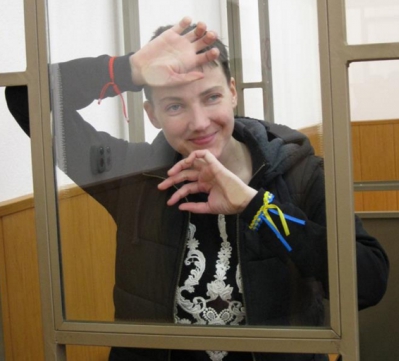Savchenko ‘Court’ rejects documentary proof of innocence
 Photo: Vladislav Ryazantsev
Photo: Vladislav Ryazantsev
The Russian court in which Nadiya Savchenko, Ukrainian MP and delegate to the Parliamentary Assembly of the Council of Europe [PACE], is on trial is allowing verbal testimony, but consistently refusing to add documents to the case which prove Savchenko’s innocence. With the trial hidden away in Russian Donetsk, the aim, as lawyer Mark Feygin points out, is clear. The court appears to be allowing the defence to have its say, while in fact blocking material which exposes the cynical lies and lack of any substance to the charges against the former Ukrainian pilot.
Nadiya Savchenko is charged with complicity in the death of two Russian journalists who were killed in mortar fire on June 17, 2014. There is no evidence at all that Igor Kornelyuk and Anton Voloshin were deliberately targeted. They had not been provided by the State-controlled Pyervy Kanal with bulletproof vests, etc. and were in an area where fierce fighting was taking place between Kremlin-backed militants and Ukrainian soldiers.
The prosecution claims that Savchenko climbed up a television tower and, at a distance of around 2.5 kilometres noticed the journalists and informed members of the Aidar volunteer battalion of their location. Neither the binoculars nor the radio system that the prosecution alleges were used to do this have been produced.
Savchenko had already been captured by Kremlin-backed militants in the Luhansk oblast when the two journalists were killed. The defence is able to prove from mobile telephone records and witness reports that Savchenko was captured at around 10 a.m., around an hour and a half before the two journalists came under fire.
The defence has, from the outset, publicly spoken of its evidence and the prosecution came up with a ‘witness’ who claimed that there were technical problems on the day in question, and that the evidence from Savchenko’s phone was therefore unreliable.
The prosecution claimed that this ‘witness’ - Mikhail Pomazan – was an employee of the Life mobile operator. The defence investigated and were informed by the company that they had never had an employee of that name. The lawyers therefore demanded that ‘Pomazan’ be summoned for cross examination. Despite the obvious validity of such an application, the judge rejected it, refused to add the letters the defence received to the file, and the written testimony was simply read out.
Last week the defence questioned Andriy Ivanov, from MTC Ukraine who in 2014 installed and serviced the mobile communication towers in the Luhansk oblast. Ivanov came vital testimony regarding Savchenko’s location when she made a call at 10.44 on June 17, 2014.
This confirms Savchenko’s alibi.
The court heard it, but refused to add the testimony to the case, claiming that this was because the evidence had been gathered on Ukrainian territory – the territory on which Savchenko was taken captive by Kremlin-backed militants before being abducted to Russia.
On Monday, the court also refused to add the letter received from the Lawyers’ Chamber of Moscow confirming that there are no geographical restrictions on where material can be obtained.
The court under presiding judge Leonid Stepanenko has also refused to allow testimony from a Ukrainian video specialist. This provides the time when the video footage of Savchenko’s capture was shot, and is clearly also of critical importance. Kremlin-backed militant leader Igor Plotnytsky, who was allowed to give secret testimony, claims, as does the prosecution, that Savchenko was captured around midday. This is refuted by the mobile telephone evidence and the timing of the video.
The list of important documents, including from Ukraine’s Justice Ministry, which the court has refused to add to the case can be continued. On Monday, Nadiya herself expressed outrage that the court is preventing her from defending herself.
Nadiya Savchenko is on her 39th day of hunger strike and is clearly weakened.
Please write to Nadiya Savchenko, if possible, in Russian. The address is:
ПКУ СИЗО-3 346408 Ростовская обл.
г. Новочеркасск, ул Украинская д.1, Савченко Надежде Викторовне





